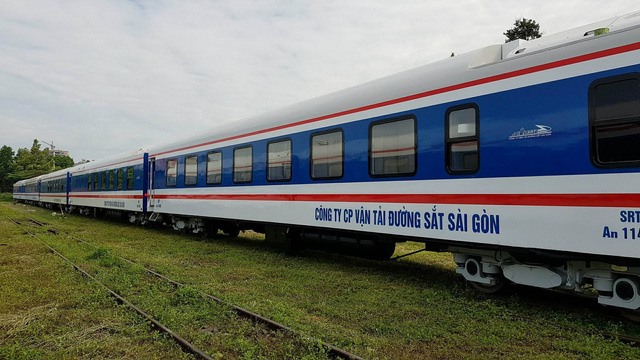VNR to offer new conveniences in 2018
Viet Nam Railways (VNR) will institute improvements in service quality and infrastructure to compete with the civil aviation and road transport sectors in 2018.
 |
| Viet Nam Railways (VNR) will institute improvements in service quality and infrastructure to compete with the civil aviation and road transport sectors in 2018.– Photo tuoitre.vn |
Data by VNR shows that, up until July, 2016, the company stopped a precipitous fall in profit and passenger numbers. However, its financial results for 2017 were negatively affected by severe natural disasters.
Vu Anh Minh, head of VNR’s member council, told Vietnam News Agency that the country rail infrastructure had to be upgraded and provide better services to attract passengers.
Focusing on creating genuine experiences, Minh stressed upon the significance of passenger-oriented strategies, starting from innovating train carriages.
In 2018, the company plans to build 6 to 10 new trains, upgrade existing ones and import locomotives, aiming to comprehensively improve its service quality by 2020.
According to Minh, a domestic-built carriage costs about 500,000 US$ (11 billion VND) each while the price of a Spanish-made carriage, for example, is up to 1.5 million € (30 billion VND). On the other hand, a foreign carriage’s design is not suitable for Viet Nam’s terrain and less developed infrastructure.
Therefore, VNR asked Viet Nam Development Bank (VDB) to provide a loan of VNĐ3,200 billion ($140 million) to invest in innovation projects.
On 10 January, VNR will officially launch 6 five-star trains on the Reunification (Ha Noi – HCM City) route.
Other improvements in food, ticket booking and other services will also be introduced. Meals produced by Southern Airports Services Joint Stock Company (SASCO) will be piloted on VNR’s trains from the same day.
“A meal costs from 25,000 to 30,000 VND (1.1 – 1.3 $) included in a ticket price, meanwhile, the ticket’s price is unchanged. This is our tactic to lure passengers’ interest in railway transport,” Minh said.
Additionally, VNR will distribute tickets for holidays 6 months early and offer promotional fares as the number of trains will be increased. “The 6 five-star trains launched on January 10 will show whether improvements satisfy passengers’ demands,” Minh said.
He also expected that the experiences created by VNR’s five-star trains would awaken passengers’ interests and switch the way they travel.
“People turned their backs on railway because of its poor quality, not high price. Therefore, we try to present better services while tightening cost management to increase the number of passengers, raise revenue and gain profit,” Minh explained VNR’s plan.
About the further development, Minh emphasised on capacity enhancement to gain a higher market share.
“When the Noi Bai – Lao Cai Expressway was opened, a lot of passenger chose to travel by road. Since then, we have carefully learnt our strengths to improve services and compete with other means of transportation. Moreover, we believe our efforts will encourage other service providers to improve and offer better experiences for passengers,” he added.
After a fortnight of use, automatic ticket gates at main stations have shown an inability to detect inaccurate information of passengers.
When a valid train ticket issued by VNR and with the correct departure time is scanned, a gate will automatically open for passengers to board the train. However, according to Sai Gon Railways, one ticket can be used several times. Moreover, automatic ticket gates cannot tell if holders have the same information as indicated on tickets or not.
Despite automatic ticket gates, railway officers have to recheck information.
Therefore, Sai Gon Railways asked VNR to tighten ticket management and add functions to respond to passengers’ demands.
From December 15, 2017, automatic tickets gates scanning QR codes on boarding passes were installed in Ha Noi and Sai Gon Railways Stations.
(Source: VNS)